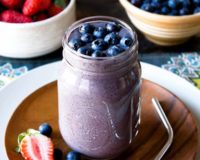A healthy diet has been scientifically proven to provide numerous benefits, such as reducing your risk of several chronic diseases, keeping your body healthy and effectively reaching your weight loss goal. However, making major changes to your diet can sometimes seem very overwhelming. Instead of making big changes to your diet plan, it may be better to start with a few smaller ones. This article discusses a few small changes that can make a regular diet a little bit healthier.
Try at Least One New Healthy Recipe Per Week
Deciding what to have for dinner can be a constant cause of frustration, which is why many people tend to use the same recipes again and again.
Aim to try making a new healthy recipe at least once per week. This can change up your food and nutrient intakes and hopefully add new and healthy recipes to your routine.
Alternatively, try to make a healthier version of a favorite recipe.
Eat Your Greens First
A good way to ensure that you eat your greens is to eat them as a starter.
By doing so, you will most likely finish all of your greens while you are the hungriest and be apt to eat less of other, perhaps less healthy, components of the meal.
Furthermore, eating vegetables before a carb-rich meal has been shown to have beneficial effects on blood sugar levels. Greens also have more nutrition than other foods.
It slows down the speed at which carbs are absorbed into the bloodstream and may benefit both short- and long-term blood sugar control in people with diabetes.
Cook at Home More Often
Try to make a habit of cooking at home most nights, rather than eating out.
By cooking your food yourself, you’ll know exactly what is in it. You won’t have to wonder about any hidden unhealthy or high-calorie ingredients.
Cooking at home has been shown to reduce the risk of excessive weight gain, especially among children.
Drink Enough Water
Drinking enough water is important for your health.
Many studies have shown that drinking water may benefit weight loss, weight maintenance and even slightly increase the number of calories you burn daily.
Studies also show that drinking water before meals can reduce appetite and calorie intake during the subsequent meal in middle-aged and older adults.
That said, the most important thing is to drink water instead of other beverages. This may drastically reduce your sugar and calorie intake.
People who drink mostly water have been shown to consume 200 fewer calories per day, on average, than those who drink other beverages.
Slow Down
The pace at which you eat influences how much you eat, as well as how likely you are to gain weight.
Your appetite, how much you eat and how full you get is all controlled by hormones. These hormones signal your brain whether you’re hungry or full.
However, it takes about 20 minutes for your brain to receive these messages, so eating more slowly would give your brain the time it needs to perceive that you are full.
Studies have confirmed this, showing that eating slowly may reduce the number of calories you consume at meals and help you lose weight.
Therefore, simply by eating slower and chewing more often, you can reduce your risk of eating too much and gaining excess weight.










